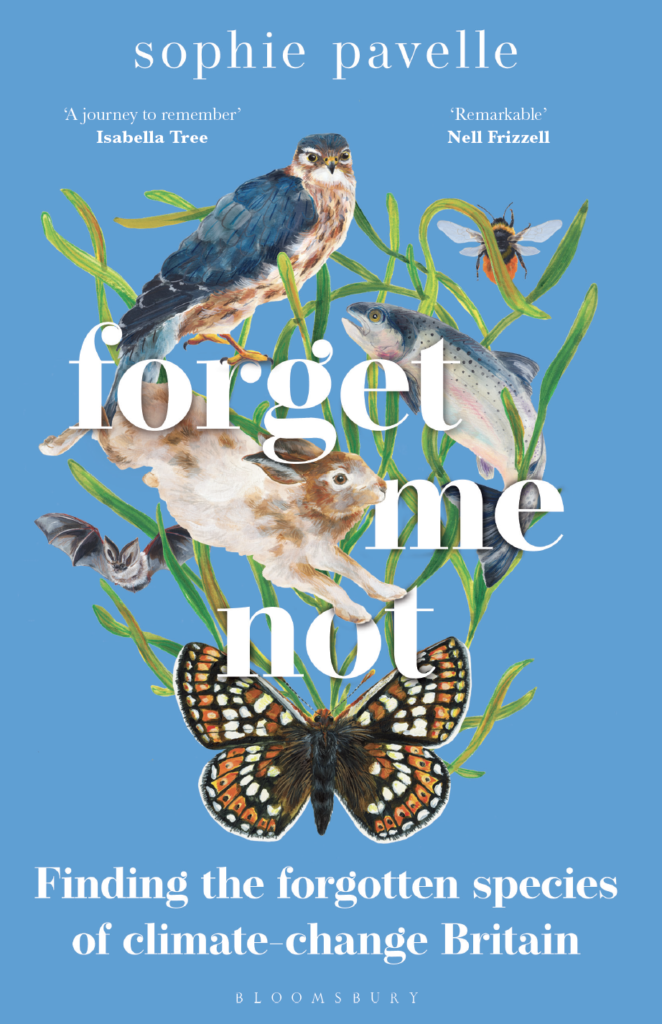Ceri Levy delves into Sophie Pavelle’s quest to visit ten climate-threatened species — finding a book which marks a changing of the guard.

In Forget Me Not, Sophie Pavelle documents her series of quests to discover the threat of climate change upon ten select species and their habitats across Britain, and to visit them wherever possible by using low-carbon travel. This proves tricky at times, considering this country’s predilection for national transport to be a precarious mode of transit. But wherever possible she gets on her bike, walks, kayaks, takes trains and tries to avoid cars — although when out of options her father gives her a lift. The target species are a varied mix and range from the Grey Long-eared Bat to Black Guillemot and Seagrass, which I have to say I have fallen a little bit in love with thanks to the passionate writing about it. The book is entertaining, insightful and its message is an urgent one.
Conservationists are increasingly recognising a tendency for the practice to take a ‘speciesist’ approach, using the celebrity of puffins, for example, to boost public intrigue. An attitude that focuses on saving one species at a time. To a certain extent, this book aims to do precisely that. Although of value, this method runs the risk of cleaving a living thing from its very surroundings – of failing to acknowledge the thread that forms the tapestry. Without habitat, there are no species to market, no flagship individuals for which to gain membership. Unfortunately, we also don’t have the luxury of time to think this way anymore. The resulting landscape soon pocked, scarred by the life it failed to parent.
Warmth exudes from every page as we make our way to each appointed destination. Sophie writes in an informal and inspirational manner and chats to us about family, friends and living life as a 20-something woman, continually updating our picture of her as we read on. But when it’s time to communicate the science and the big information, the facts are imparted succinctly with a beautiful turn of phrase, summing up the precarious position that conservation finds itself in. This is a clarion call for us all to do something to make a difference.
The title, Forget Me Not, makes me think about how often we forget things when we stop talking about them and species are no exception. Conversation keeps their presence alive and with an open dialogue, talking about their plight and possible remedies, we can help them. This book shines a light on species we may never have given a second thought to but now I better understand their roles within our fragile ecosystem and their importance and relevance more than before.
Until I wrote this book, I was among the millions who were unaware of the submerged meadows that border the coastline of the British Isles, let alone even remotely awake to its importance and plight. Foxes were braver. Orcas felt bigger. Woodland, more tangible. But the very idea of submerged meadows that annually flower and go to seed after summer, that have teams of crustacean pollinators and that house an entire world of dependent life, soon reeled me in hook, line and sinker. Some meadows are so vast that they could cover more than 400,000 rugby pitches. How these have passed us by for so long is a mystery. But I’m in the market for it.
Me too.
Looking back, I think swimming among seagrass could rank in the top five of the great human experiences. We forget the tender joy the natural world can illicit. Its raw force muffled under a duvet of digital distraction.
Digital distraction there may be, but Sophie understands the power of the digital world and is part of the vanguard of a younger demographic that are taking conservation by the scruff of the neck and battling for nature’s future. Social media has played a huge part in this youthful connectivity, and it may be a series of #hashtags, posts, memes and exchanges of thoughts and images on various platforms, which get pooh-pooed by previous generations, but this is the modern world and it’s not going away. It can be a powerful tool to unite people with common aims and goals and Sophie often presents her thoughts, work and ideas online to her audience. So, it’s a perfect time to watch her break out from that very 21st century world into the traditional world of books — a worthy addition to the ranks of nature writers that have gone before her. Here is a vibrant and vital voice from the millennial generation that is fighting climate change and its devastating effect on the world around us. We have a changing of the guard and oddly, there has never been a better time to feel we are in more caring hands to protect the planet. The world must let the new broom of youth do its work.
Sophie wishes that we could enjoy nature for nature’s sake and just be a part of it. But to get to that point where we happily co-exist with other species within it, we need to secure a safer future for them. Consequently, we must keep the problem-solving conversations going. By doing so, we will recall all the things we must not forget to protect. Forget Me Not for one, will not be forgotten.
*
‘Forget Me Not: Finding the forgotten species of climate change Britain’ is out now, published by Bloomsbury.
Listen to Sophie Pavelle in conversation with Ceri on the Gonzovation Conversations podcast, available here and on all streaming platforms.